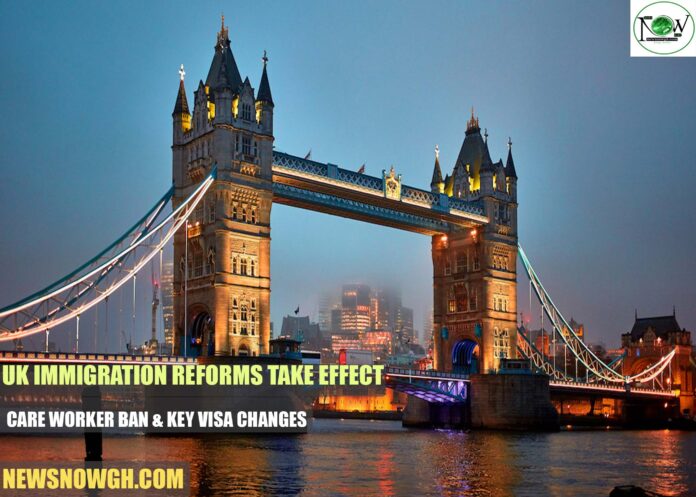UK Immigration Reforms Take Effect: Care Worker Ban & Key Visa Changes
Starting July 22, 2025, the UK is implementing significant immigration reforms. These changes include a ban on hiring overseas care workers and a reduced list of eligible skilled worker roles. Here’s what you need to know about these updates and what lies ahead.
The United Kingdom officially begins the first phase of its immigration reforms today. These changes are part of the immigration white paper titled “Restoring Control Over the Immigration System.” This policy outlines a stricter approach to immigration and settlement in the UK.
If you’re a foreign worker, student, sponsor, or employer, here’s a detailed breakdown of the immediate changes and upcoming developments.
Key Immigration Changes Starting July 22
Skilled Worker Occupation List Gets Smaller
From today, employers can no longer sponsor overseas workers for medium-skilled roles (RQF levels 3–5). Exceptions may apply only with approval from the UK’s Migration Advisory Committee. This significantly narrows the pool of eligible jobs, and this list will remain effective through the end of 2026.
Ban on Overseas Recruitment for Care Workers
Effective immediately, employers cannot hire care workers from abroad under the Skilled Worker visa route. If you are already working in the UK as a care worker and were sponsored before July 22, you are secure. However, no new applications for care worker roles from overseas will be accepted.
Tighter Student Visa Rules Coming Soon
Although not effective yet, several education reforms are on the horizon:
- Stricter compliance checks on universities sponsoring international students.
- A proposed levy on income from foreign student tuition fees, pending parliamentary approval.
- The Graduate visa period will shorten from two years to 18 months.
- Higher English language standards will be introduced for students and their dependents by year’s end.
- These measures aim to reduce misuse and refocus on high-skilled, long-term migration.
Ten-Year Wait for ILR Under Review
A controversial proposal is to extend the qualifying time for permanent residence (Indefinite Leave to Remain or ILR) from five to ten years. This proposal is still under consultation. The Home Office is also considering a new “earned settlement route” for those who significantly contribute to the UK economy. However, details are still pending.
Groups likely exempt from this extended wait include:
- Spouses and partners of British citizens
- Victims of domestic abuse
- EU citizens under the Settlement Scheme
It remains unclear whether routes like the Hong Kong BN(O) or Skilled Worker visas will be included. Further consultations are expected later this year.
Not All Changes Require Parliamentary Approval
Most reforms can be enacted through changes to immigration rules without needing a full parliamentary vote. Unless Parliament formally objects within 40 days—a rare occurrence—the rules will automatically become law. Only proposals like the tuition levy or changes to citizenship laws will require full legislation.
What This Means for You
If you plan to move to the UK for work or study, or if you’re nearing the five-year mark for settlement, take note.
- Care workers should act quickly if considering UK migration, as new applications are no longer accepted.
- Employers need to adjust hiring plans, especially for medium-skilled roles.
- Students and sponsors should prepare for stricter regulations by the end of 2025.
- Migrants on a path to ILR should follow consultations closely, as the ten-year rule may impact them.
Final Thoughts
The UK’s immigration system is shifting toward tighter controls, fewer sponsored roles, and longer settlement pathways. While today’s changes are just the beginning, the trend is clear: increased scrutiny and a focus on local hiring. Stay informed, as the rules for living, working, or studying in the UK are evolving rapidly.
Follow NewsNowGh to stay updated on the latest information regarding work permits, visas, and visa-sponsored employment.


